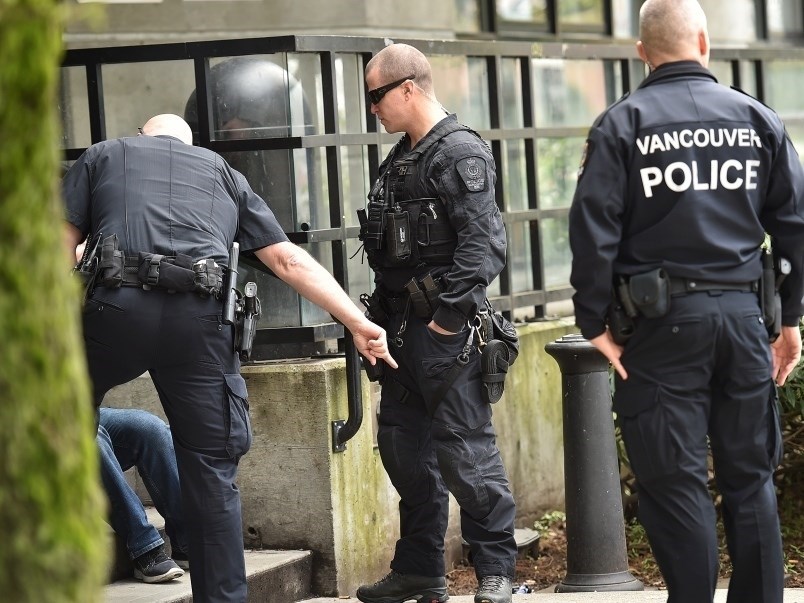Allegations that two Vancouver police officers made racist and inappropriate comments during ride-alongs with researchers conducting a review of the department’s practice of “street checks” may never be proven.
That’s because the independent consultant hired to conduct the review — Pyxis Consulting Group Inc. — has refused to cooperate in a police investigation and has destroyed its field notes used to make the allegations, which were published in a draft report.
Those allegations were omitted from the final report seen by the public.
It was only after continued pressure from the Union of B.C. Indian Chiefs and the B.C. Civil Liberties Association and their correspondence with Police Complaint Commissioner Clayton Pecknold that the allegations came to light.
Pecknold has since written a letter to both human rights groups stating the police investigation of the two officers has hit a roadblock because of the unwillingness of Pyxis’s principals and eight researchers to answer questions or provide documentation.
“The VPD [internal affairs] investigating officer has conducted a thorough and responsive investigation to this point canvassing all available avenues of investigation,” Pecknold wrote in a July 30 letter to the groups.
“Despite this, the investigator was unable to identify the officers who are alleged to have made the comments due primarily to the lack of cooperation by the Pyxis personnel. Additionally, their lack of cooperation has made it unclear as to when precisely the field notes were destroyed.”
Pecknold also made it clear in his letter that it was VPD civilian employees who flagged the comments in the draft report and reported it to the department’s executive, which led to the investigation by internal affairs.
Glacier Media obtained a copy of the draft report under the Freedom of Information and Protection of Privacy Act. Parts of the section regarding the allegations against the officers were redacted.
“On one ride-along…one of the officers made a number of inappropriate, racially insensitive comments to the researcher and his partner throughout the shift,” said the report, which didn’t name the officers.
“These comments were extremely inappropriate and highly concerning. An officer on another ride-along also made a number of inappropriate comments about vulnerable and marginalized people, and appeared to have considerable anger issues. When interacting with members of the public, he was overly terse and, on one occasion, extremely rude.”
Added the report: “While these officers were clear exceptions, their behaviour and attitude were highly concerning and something the VPD needs to address.”
The Vancouver Police Board hired Pyxis in January 2019 to conduct the review. Ruth Montgomery, a former Edmonton police superintendent, operates Pyxis. Glacier Media sent an email to Montgomery Friday for comment but had not heard back at the posting of this story.
In its final report, Pyxis said it was unable to conclude that officers were motivated by racism or bias when stopping a person on the street, despite VPD data showing an overrepresentation of Indigenous and Black people checked by police.
The review found that more than 40 per cent of the street checks were “justified with a bylaw stop.” Another 25 per cent were justified as “possible criminal behaviour.”
“Overall, very few of these street checks appears on its face to be unwarranted or unreasonable,” the report said of the practice that allows an officer to stop a person to conduct an interview or investigation in regards to suspicious activity or a suspected crime.
Under the Police Act, police officers are compelled to provide statements and answer questions, but civilian witnesses to an incident are not. Pecknold made this point in his letter, saying Pyxis employees couldn’t be compelled to participate in the investigation.
“As no officers have been identified, no further steps under the Police Act related to the determination and adjudication of misconduct can occur,” he said.
“Should information become available at a future point making further investigation practicable, I will re-initiate the matter.”
In the meantime, Pecknold said the province’s director of police services will conduct an examination of the Vancouver Police Board’s decision to hire Pyxis. The goal is to provide an understanding of practices employed in the retention and governance of the consultant, along with methodologies used.
“This includes the destruction of records and the circumstances of the removal of the paragraph containing the allegations of misconduct from the original draft report,” he said.
“These matters are outside of the purview of the disciplinary conduct investigation, but I will recommend be fully canvassed by the director.”
Members of the Union of B.C. Indian Chiefs, B.C. Civil Liberties Association and Hogan’s Alley Society expressed their disappointment this week in learning the investigation has hit a roadblock.
In a news release issued Thursday, Don Tom said he found it curious how the police department couldn’t identify the officers in question.
“It can’t be that difficult to figure out what police officers are conducting which ride-alongs,” said Tom, vice-president of the Union of B.C. Indian Chiefs.
“Either they need to re-evaluate their record keeping and accountability system, or the thin blue line is closing ranks. Regardless, this is unacceptable.”
Meanwhile, Vancouver city councillors were unanimous July 22 in supporting a motion from Mayor Kennedy Stewart that urges the police board to end the practice of street checks in the city.
The move builds on a separate motion that police board member Rachel Roy intends to put forward in September that will request an internal review of the department’ new street check policy adopted in January.
Roy, a lawyer who specializes in labour and human rights law, gave verbal notice of her intent at the board’s June 25 meeting and added that such a review should consider whether Vancouver officers should be banned entirely from using street checks.
The board’s next public meeting is scheduled for Sept. 17.
@Howellings



